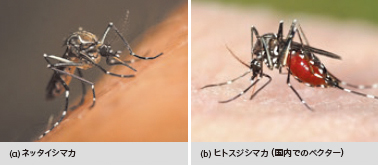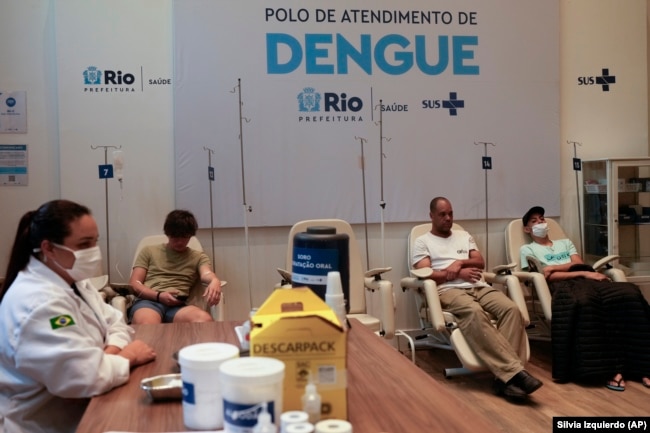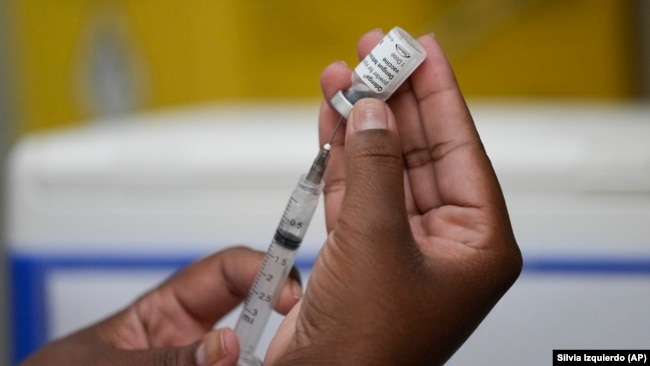デング熱はデングウイルスによる肝炎症でネッタイシマカやヒトスジシマカによって感染します。感染症法は4類感染症に分類〜デングウイルスには4つの血清型(DENV-1、DENV-2、DENV-3、DENV-4)があり、4つ全てが現在いアメリカ大陸で流行っています。寒い冬は蚊が媒介する疾病の通年感染を防ぎますが、ヨーロッパでもデングウイルスの感染に適した機構が増えつつあり、洪水や淀んだ水溜りの発生につながっています。
※厚生労働省検疫所より(症状なども詳しく掲載されています)
デング熱ー世界の状況:デング熱-世界の状況

デングウイルスを媒介する蚊 (上記写真下記URLより)
蚊媒介ウイルス感染症の職業感染事例から学ぶ標準予防策の重要性 | 日本BD
ヒトスジシマカは日本にいる蚊ですが、ネッタイシマカ生息していないそうですが、コロナ後ひとの流れが増大していますので、人食いバクテリアにばかり気を取られていましたが、これからの季節長袖長ズボンに虫除けスプレーで対策する必要がありますね!!
UN Authorizes Second Shot to Fight Dengue in Americas
The World Health Organization recently authorized a second dengue vaccine. The move could provide protection for millions of people worldwide against the mosquito-borne disease.
This year, several dengue outbreaks have happened in places across the Americas.
In a statement on May 15, the U.N. health agency said it approved the dengue vaccine made by the Japanese drugmaker Takeda.
Takeda’s dengue vaccine is known as Qdenga. It was previously approved by the European Medicines Agency in 2022. The two-dose vaccine is given three months apart. It protects against the four kinds of dengue. The WHO recommends its use in children between the ages of 6 and 16 who live in areas with high rates of dengue.
Approval by the WHO now means that donors and other U.N. agencies can purchase the vaccine for poorer countries.
Studies have shown Takeda’s vaccine is about 84 percent effective in preventing people from being hospitalized and about 61 percent effective in stopping symptoms.
WHO’s Rogerio Gaspar is director for the agency’s approvals of medicines and vaccines. He said it was “an important step in the expansion of global access to dengue vaccines.”
The first dengue vaccine that the WHO approved was made by the drugmaker Sanofi Pasteur. The vaccine was later found to increase the risk of severe dengue in people who had not been infected with the disease before.
There is no exact treatment for dengue. It is a leading cause of serious illness and death in about 120 Latin American and Asian countries. About 80 percent of infections are mild. But severe cases of dengue can lead to internal bleeding, organ failure, and death.
Last week, the WHO reported there were 6.7 million suspected cases of dengue in the Americas. That is an increase of 206 percent compared with the same period last year. In March of this year, officials in Rio de Janeiro declared a public health emergency over its dengue epidemic. Brazilian health officials began giving out the Takeda vaccine with the goal of protecting at least 3 million people.
Infectious disease experts say climate change and the increased range of mosquitoes that carry dengue are partly to blame for the spread of the disease.
Words in This Story
authorized –adj. having or done with legal or official approval
borne –adj. transported or transmitted by —used in combination as in mosquito-borne illness
previously –adv. going before in time or order
symptom –n. a change in a living thing that indicates the presence of a disease or other physical disorder
global –adj. of, relating to, or involving the entire world
access –n. permission or power to enter, approach, or make use of
mild –adj. moderate in action or effect : not severe
epidemic –n. spreading widely and affecting many individuals at one time
世界保健機関はこのほど、2種類目のデング熱ワクチンを承認しました。これにより、(the mosquito-borne)蚊が媒介するデング熱から世界中の数百万人を守ることができます。
今年、デング熱の流行はアメリカ大陸のあちこちで起こっています。
5月15日の声明で、国連保健機関は日本の製薬会社である武田薬品が製造したデング熱ワクチンを承認したと発表しました。
武田薬品のデング熱ワクチンは(Qdenga)キュデンガとして知られています。このワクチンは先に2022年に欧州医薬品庁から承認されています。2回接種のワクチンは3ヶ月間隔で接種されます。このワクチンは4種類のデング熱を予防します。WHOは、デング熱の発生率が高い地域に住む6歳から16歳の子供への使用を推奨しています。
WHOによる承認は、寄付国や他の国連機関はより貧しい国のためにこのワクチンを購入することができるようになったことを意味します。
調査によると、武田薬品のワクチンは、入院を防ぐ効果は約84%、症状を止める効果は約61%となっています。
WHOのロジェリオ・ガスパール局長は、医薬品とワクチンの承認を担当しています。彼は、”これはデング熱ワクチンへの世界的なアクセス拡大における重要な一歩である”と述べています。

FILE-ブラジル、リオデジャネイロの保健センターで治療を受けるデング熱の疑いのある患者(2024年2月23日)。(AP Photo/Silvia Izquierdo)
WHOが最初に承認したデング熱ワクチンは、製薬会社のサノフィ・パスツール社製でした。このワクチンは後に、それまでデング熱に感染したことのない人の重症化リスクを高めることが判明しました。
デング熱の正確な治療法はありません。デング熱は、ラテンアメリカとアジアの約120カ国において、重篤な病気と死亡の主な原因となっています。感染の約80%は軽症です。しかし、デング熱が重症化すると、(internal bleeding)内出血、(organ failure)臓器不全、死に至ることもあります。
先週、WHOはアメリカ大陸で670万人のデング熱感染の疑いがあると報告しました。これは昨年の同時期と比較して206%の増加です。今年3月、リオデジャネイロ当局はデング熱の流行に対して公衆衛生上の緊急事態を宣言しました。ブラジルの保健当局は、少なくとも3300万人を守ることを目標に、武田薬品のワクチンの接種を開始しました。
感染症の専門家は、気候変動とデング熱を媒介する蚊の生息域の拡大がデング熱の蔓延の一因であると述べています。
